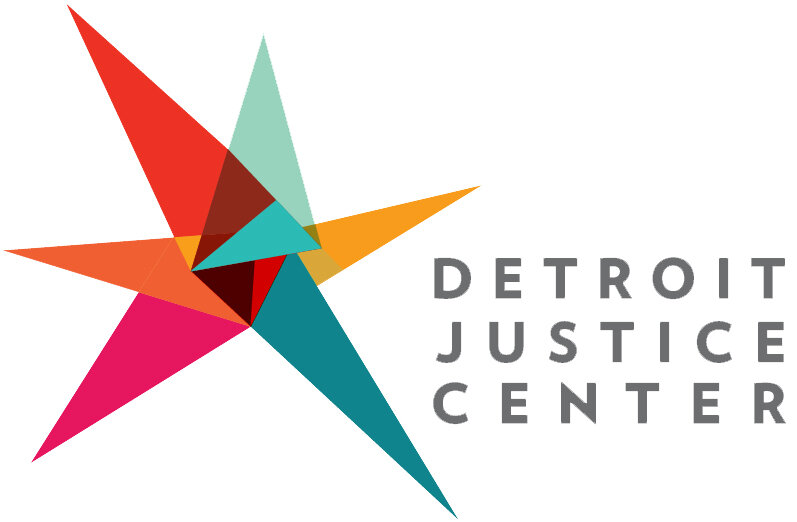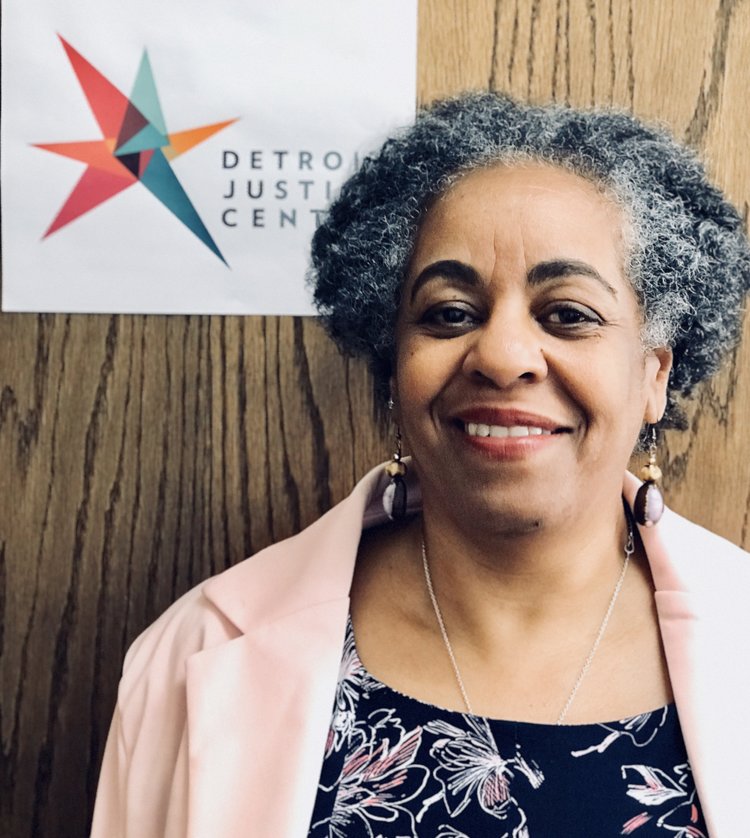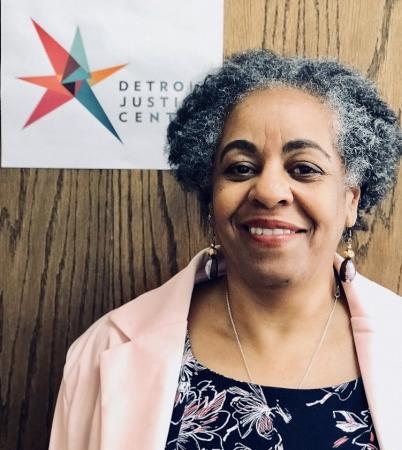An Interview with Legal Director and Senior Staff Attorney, Desiree Ferguson
Casey Rocheteau: How did you find out about DJC and what made you get involved with the organization?
Desiree Ferguson: I found out about DJC when it was a little baby fluttering around in Amanda’s head and heart. The last 27 years of my life, I was working at the State Appellate Defender Office (SADO) doing criminal defense appeals for indigent populations. I have also been active in the National Conference of Black Lawyers (NCBL) for many years.
In conjunction with my job at SADO, I was teaching a clinic at the University of Michigan Law School. I met Amanda because the clinical faculty would have meetings together, and you see another brown face and you’re like “Who are you?” So we connected, and I knew she was a perfect addition to NCBL, so I lured her into my little sisterhood group of women lawyers connected to NCBL. And so we would meet and have lunch, and I knew the idea of DJC was percolating. Then I learned when she got the money and it was starting up. Around the same time, I had a whole lot of really, really difficult stuff in my life that derailed me, and I said to myself, “You know what? I’m going to retire, I can’t manage all this stuff.” So I had decided I was retiring from SADO. One day I was sitting down to lunch with Amanda and I told her I’m retiring, and she said “No, I think you should consider being my legal director.” It was just too good to be true, it would feel so good to be able to end my career like that, instead of in this other way. So here I am.
CR: Explain to me a little bit about the work you do. What does the Legal Director/Senior Staff Attorney position entail on a day to day basis?
DF: I am figuring that out as I go and juggling balls all over the place. There are a number of different projects that I’m supervising—for instance, the Community Legal Worker project. We just brought on five Community Legal Workers to assist residents with property tax assessment appeals—they’ll help people avoid tax foreclosure. When we were recruiting, I went to a meeting of the Coalition to End Unconstitutional Tax Foreclosures and let them know we were hiring for these positions. So, that’s one project.
CR: That’s the program where lay people are being trained to help people navigate systems?
DF: Yes, we call them Community Legal Workers. You don’t need a law degree to assist people with these issues, you just need to be an intelligent, astute person who wants to help people. We’re training them on the specifics of how to do property tax assessment appeals, and they’ll help people fill out the paperwork and go to hearings with them and advocate.
I also supervise the staff attorneys and interns—I’ve developed systems for keeping them on track with their workplans. Then there’s the prison “in-reach” legal services pilot. DJC designed a pilot, and got a grant from the Detroit Regional Workforce fund, to go into prisons and provide legal services to people who are soon to be released. That way they can leave prison with a clean slate in terms of warrants, child support debt, and other outstanding matters that might hold them back. We’re doing this at four facilities. We’ve developed an intake sheet and flyers to put in strategic places, so a woman who’s incarcerated in Huron Valley Correctional Facility, for example, who’s about to be released in three months would see a flyer and say “Wow, you’re dealing with child custody and I need to deal with that. Can I see these lawyers that are coming?” They’d have her fill out the intake sheet and they send it to me, and I put her in a list of people who I’m going to see the next time I come.
Those are all of the projects I’m working on in addition to client representation. I also meet with our referral partner agencies—organizations that focus on job placement for people with criminal records, for instance. I develop an MOU with them and work out whatever our arrangement is going to be, in terms of them sending us clients so that we can help reinstate driver’s licenses, clear warrants, assist with housing and custody matters, and more.
CR: Let’s talk about your connection to Detroit. Why is it important to be doing this work here?
DF: Because any imaginable issue pertaining to economic justice, social justice, racial justice–we got it. We are the connecting point for everything. I’m a native Detroiter. I’ve always lived here, aside from when I went to school in Ann Arbor. And it’s hard to look at your home under that microscope, but for me, it’s just always felt like the most real place in the world, the place where people’s struggles to survive and persevere are at our core. All this new stuff feels foreign and strange to me, I don’t comprehend it. There are pros and cons for me—I do delight in seeing buildings come up and people walking around and shops and restaurants and exciting fun things to do, that’s all wonderful. At the same time, I live in a regular Detroit neighborhood. I don’t live in any special upscale newbie development, and it’s like a tale of two cities.
CR: What is your advice to new people coming into Detroit?
DF: I’m not sure how to answer that, but I think it’s good to come in and say: What’s the truth? Who are the real people? Who built this place? Who deserves credit for holding it down when everybody else was down on it? I don’t like that narrative of “coming back,” because I feel like coming back from what, and to what? We were here, we’ve been here, we ain’t left. One should recognize and acknowledge that you have a privilege of being able to just come into something new and flourishing and witnessing the beautiful stuff that most new people won’t see because they won’t dig underneath. I think the challenge is to try to keep it real for the people that built it, to keep us in the proper light and the proper respect and the proper attention. That’s what I would like for people to do. There’s work to be done in the real Detroit.


